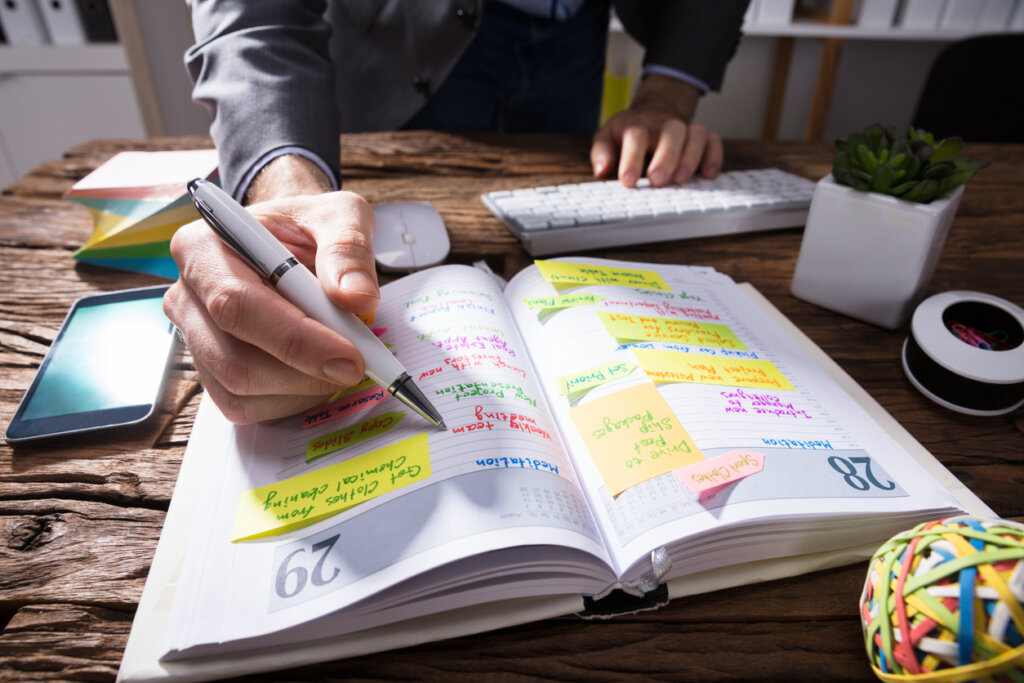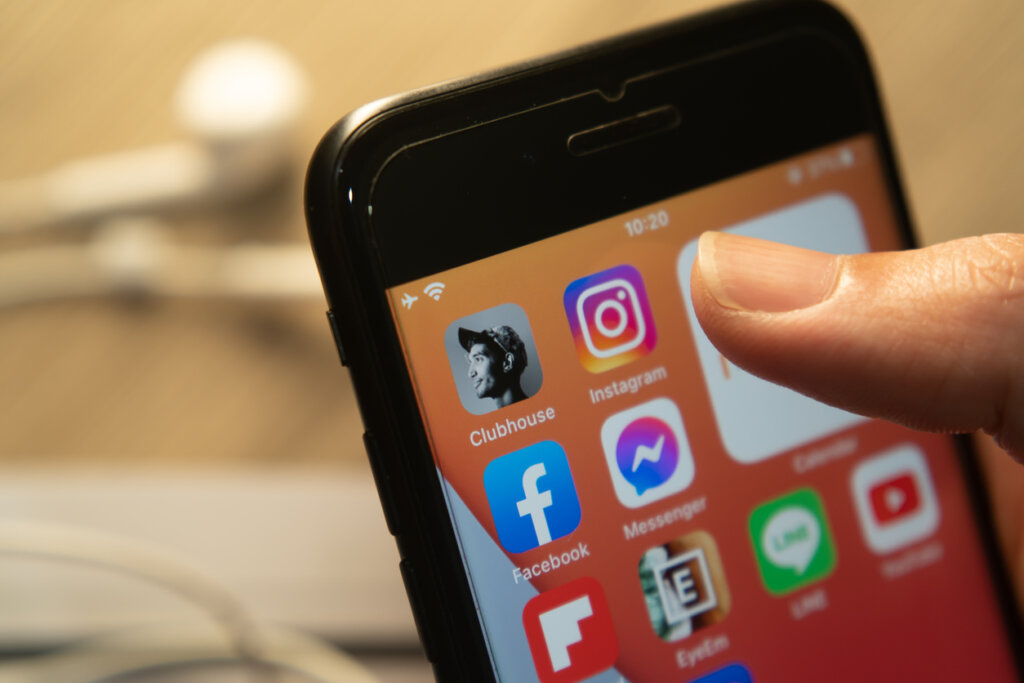Nine Tips to Help You Combat Mental Distractions

During the working day, it’s pretty common for your mind to wander and get lost in matters unrelated to work. For example, it’s normal that you repeatedly check your cellphone, look at social media, and think about what you’re going to do at the end of the day. You also daydream, pay attention to any sounds around you, etc. However, if you want to be more productive, you need to learn how to combat these mental distractions.
Next, we show you how.
Nine keys to combat mental distractions
Mental distractions affect everyone. Fortunately, we can control them and improve our concentration with practice. Here are some effective strategies to help you achieve this:
1. Be aware of your distractions
One of the first steps to combat them is to identify which ones affect you. After all, not everyone is distracted by the same things, so you need to know which are relevant to you.
Chris Bailey, the author of the bestseller, The Productivity Project, recommends writing down the stimuli that distract you. In doing so, you must consider that it’s not only external distractions (such as noise or mobile phones) that affect your attention. In fact, the internal ones (such as thoughts or worries) are also a source of distraction.
Once you’ve identified them, you’ll find it easier to recognize them during your day. This will help you to refocus on your previous activity. To stay focused you can repeat phrases like “I must stay in the present” or “This is what I need to do”. You’ll soon see that you’ll gradually be able to re-establish your focus.

2. Prepare your work environment
Ideally, you should have a place where you can work comfortably and for long periods of time. To do this, you need a comfortable desk and seat, good lighting, as well as a tidy space free of any distracting noise.
If you work in a noisy area, you can use earplugs or noise-cancelling headphones. In fact, you should be in an environment that allows you to perform your tasks more easily.
3. Set two-three daily goals
Overloading yourself with activities ends up overwhelming you and compromising your performance. Therefore, it’s best to set yourself between two to three daily goals which are small and, above all, attainable.
To do this, before starting your working day, write down on a whiteboard or in a notebook the objectives that you want to meet. You can start with more specific and simple tasks, and increase their level of difficulty as you start to feel more confident.
4. Make sure others don’t distract you
If you’re doing important work, it’s best to avoid being distracted by others. To do this, find a space where it’s unlikely that people will disrupt you. Also, tell them that you don’t want to be interrupted.
5. Turn off cellphone notifications
Cellphones are one of the most common sources of distractions today. Therefore, you must develop effective strategies to control them. For instance, you can silence notifications, turn off the phone, or place it in airplane mode.
However, cellphone addicts often end up breaking their own agreements. If you’re one of them, you need to develop discipline at these times. Bailey suggests swapping phones with an office colleague, as it helps combat the temptation to keep your phone nearby.
6. Set a work schedule
This advice applies more to those whose work schedules are flexible or who work on their own. If you’re in this situation, you should identify what time of day you work at your best level, and structure your to-do list based on this information.
For example, most people work best early in the morning; but there are others who are more productive at night. It’s important that you get to know yourself and identify when you’re at your most productive. This will keep you more focused and make it easier for you to combat mental distractions.
7. Take short breaks
It’s impossible to keep your attention 100 percent focused during the entire working day. Therefore, you must establish short periods of rest to clear your mind, eat a sandwich, rest your eyes, etc.
Ideally, you should take a break of 15 or 20 minutes after each hour of work. That’s because most of us can only maintain our concentration for about an hour or less. Consequently, working beyond this period without a break can be counterproductive.

8. Get enough sleep
Another key to combating distractions is getting enough sleep at night. The amount of sleep that each person requires varies. However, most people need about seven hours of restful sleep.
To guarantee a good rest, you should turn off all electronic devices at least one hour before you go to sleep.
9. Practice meditation or mindfulness
Meditating is an extremely effective practice to keep you more positive and focused on the present moment. Among its benefits are improved well-being; stress and anxiety reduction; increased self-esteem, and better quality of sleep.
To enjoy the benefits of meditation, you need to make it a habit. You should practice it between 20 to 30 minutes during the day, preferably in the morning, before starting your working day.
To conclude, remember that you need perseverance and practice to encourage these habits and combat your mental distractions effectively.
During the working day, it’s pretty common for your mind to wander and get lost in matters unrelated to work. For example, it’s normal that you repeatedly check your cellphone, look at social media, and think about what you’re going to do at the end of the day. You also daydream, pay attention to any sounds around you, etc. However, if you want to be more productive, you need to learn how to combat these mental distractions.
Next, we show you how.
Nine keys to combat mental distractions
Mental distractions affect everyone. Fortunately, we can control them and improve our concentration with practice. Here are some effective strategies to help you achieve this:
1. Be aware of your distractions
One of the first steps to combat them is to identify which ones affect you. After all, not everyone is distracted by the same things, so you need to know which are relevant to you.
Chris Bailey, the author of the bestseller, The Productivity Project, recommends writing down the stimuli that distract you. In doing so, you must consider that it’s not only external distractions (such as noise or mobile phones) that affect your attention. In fact, the internal ones (such as thoughts or worries) are also a source of distraction.
Once you’ve identified them, you’ll find it easier to recognize them during your day. This will help you to refocus on your previous activity. To stay focused you can repeat phrases like “I must stay in the present” or “This is what I need to do”. You’ll soon see that you’ll gradually be able to re-establish your focus.

2. Prepare your work environment
Ideally, you should have a place where you can work comfortably and for long periods of time. To do this, you need a comfortable desk and seat, good lighting, as well as a tidy space free of any distracting noise.
If you work in a noisy area, you can use earplugs or noise-cancelling headphones. In fact, you should be in an environment that allows you to perform your tasks more easily.
3. Set two-three daily goals
Overloading yourself with activities ends up overwhelming you and compromising your performance. Therefore, it’s best to set yourself between two to three daily goals which are small and, above all, attainable.
To do this, before starting your working day, write down on a whiteboard or in a notebook the objectives that you want to meet. You can start with more specific and simple tasks, and increase their level of difficulty as you start to feel more confident.
4. Make sure others don’t distract you
If you’re doing important work, it’s best to avoid being distracted by others. To do this, find a space where it’s unlikely that people will disrupt you. Also, tell them that you don’t want to be interrupted.
5. Turn off cellphone notifications
Cellphones are one of the most common sources of distractions today. Therefore, you must develop effective strategies to control them. For instance, you can silence notifications, turn off the phone, or place it in airplane mode.
However, cellphone addicts often end up breaking their own agreements. If you’re one of them, you need to develop discipline at these times. Bailey suggests swapping phones with an office colleague, as it helps combat the temptation to keep your phone nearby.
6. Set a work schedule
This advice applies more to those whose work schedules are flexible or who work on their own. If you’re in this situation, you should identify what time of day you work at your best level, and structure your to-do list based on this information.
For example, most people work best early in the morning; but there are others who are more productive at night. It’s important that you get to know yourself and identify when you’re at your most productive. This will keep you more focused and make it easier for you to combat mental distractions.
7. Take short breaks
It’s impossible to keep your attention 100 percent focused during the entire working day. Therefore, you must establish short periods of rest to clear your mind, eat a sandwich, rest your eyes, etc.
Ideally, you should take a break of 15 or 20 minutes after each hour of work. That’s because most of us can only maintain our concentration for about an hour or less. Consequently, working beyond this period without a break can be counterproductive.

8. Get enough sleep
Another key to combating distractions is getting enough sleep at night. The amount of sleep that each person requires varies. However, most people need about seven hours of restful sleep.
To guarantee a good rest, you should turn off all electronic devices at least one hour before you go to sleep.
9. Practice meditation or mindfulness
Meditating is an extremely effective practice to keep you more positive and focused on the present moment. Among its benefits are improved well-being; stress and anxiety reduction; increased self-esteem, and better quality of sleep.
To enjoy the benefits of meditation, you need to make it a habit. You should practice it between 20 to 30 minutes during the day, preferably in the morning, before starting your working day.
To conclude, remember that you need perseverance and practice to encourage these habits and combat your mental distractions effectively.
This text is provided for informational purposes only and does not replace consultation with a professional. If in doubt, consult your specialist.







